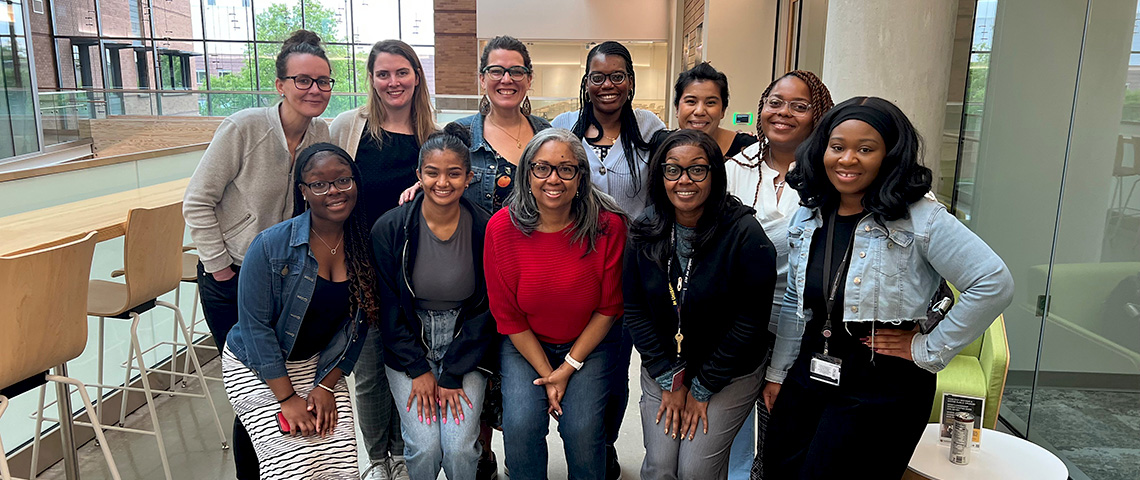Restorative Practices
The RP program places UMSON at the forefront of fostering robust and healthy relationships across the campus and our local communities. It broadens the School’s conflict-resolution repertoire by increasing connection and relationship-building. The bedrock of this restorative approach is a commitment to respecting the dignity of all individuals affected by harm, with the goal of facilitating understanding, supporting accountability, and providing a platform for healing through collaborative means. These practices include responsive circles, restorative dialogues, and restorative conferences.
Philosophy and Values of Restorative Practices
RP is a paradigm shift in the perception of justice, prioritizing repair over retribution or punishment. The RP process offers a structured framework focusing on restoration and healing through collaborative engagement with all stakeholders. A restorative approach maximizes the exchange of information, active participation, dialogue, and mutual consent between those who caused harm and those who experienced it.
The restorative framework is characterized by:
- inclusion and participation: involvement of all relevant parties
- compassionate communication: fostering connection that includes empathy, kindness, and deeper understanding and support of other perspectives and lived experiences as expressed by individuals and communities
- openness to learning: recognizing and exploring the disparity between intent and impact
- collaboration: working together to address the individual and community needs arising from harm and to create positive connections through community-building to support authentic relationships.
Current Initiatives:
(programming available in person and virtually)
- Restorative Dialogues: Engaging in responsive circles to address interpersonal conflict, social concerns, and political unrest by providing support as we process current and historic harms and seek to build an inclusive School community
- Integration into Bachelor of Science in Nursing (BSN) Curriculum: Infusing restorative practices into the BSN curriculum to foster community-building among students, faculty, and staff
- Faculty and Staff Development Sessions: Implementing restorative practices during professional development sessions for faculty and staff
- Skill-Building Sessions: Enhancing the capacity of the current RP facilitator team through skill-building sessions
- Community-Building Opportunities: Providing diverse settings, such as workshops and meetings, for students, faculty, and staff to engage in community-building
What We Offer
Restorative Practices facilitators are trained to offer the following list of programs and interventions:
Restorative Community-Building Circles: In a restorative community-building circle, individuals come together in a structured and inclusive dialogue format to build community, promote healing, or address conflicts. This facilitation technique emphasizes open communication, active listening, and shared responsibility. Circles provide a safe space for participants to express their feelings, perspectives, hurts, and needs, fostering a deeper understanding among those involved.
Possible Applications: professional development, classroom discussion, or team building
Restorative Harm Circles: Restorative harm circles are effective when addressing interpersonal conflicts, disciplinary matters, or situations in which harm has occurred. When participating in a restorative harm circle, participants collaborate on the impact of their actions, work to repair relationships, and collectively decide on meaningful resolutions. This approach addresses the immediate issues and cultivates a supportive, empathetic community that values accountability, healing, and mutual growth.
Possible Applications: addressing current events, interpersonal conflict, or code of conduct and academic integrity violations
At this time, we are not offering this resource.
Restorative Conferences: A restorative conference is a structured meeting facilitated by a trained RP facilitator. The conference brings together parties directly involved in a harmful incident, along with affected stakeholders. It is effective for situations in which a more comprehensive and in-depth dialogue is needed to address harm. Restorative conferences are effective when addressing serious offenses, conflicts, or complex situations within a community. Restorative conferences enable participants to share their perspectives, express their feelings, and work collectively toward understanding and repairing harm. This approach fosters a sense of responsibility and accountability. Participants actively create a space for healing and reconciliation, contributing to the restoration of relationships and the overall well-being of the community.
Possible Application: individual or small group process to address interpersonal or organizational harm
At this time, we are not offering this resource.
Faculty and Staff Development: Restorative faculty and staff development sessions are designed to equip educators and administrative personnel with the skills and knowledge necessary to integrate RP principles into their work environments. They are beneficial during times of significant organizational change. They aim to create a culture of empathy, understanding, and accountability. Restorative practices support faculty and staff in responding to disciplinary challenges, improving communication around conflict resolution, and fostering an inclusive and supportive learning environment. RP development sessions contribute to the overall well-being of the academic community and enhance the effectiveness of restorative practices within the educational setting.
Possible Applications: training that addresses the unique needs of your department, team, or workgroup in collaboration with RP facilitators.
Become a Facilitator of Restorative Practices (FRP)
The RP program offers a Level 1 and Level 2 training for faculty and staff who wish to become facilitators. This training provides an opportunity to serve the UMSON community and facilitate community-building and conflict resolution across the organization.
As an FRP, faculty and staff:
- participate in monthly FRP planning/training meetings
- facilitate a minimum of four RP interventions throughout the year based on program needs
- RP interventions include community building circles, harm circles, restorative conferences, facilitation of professional development and training, student orientations and trainings, etc.
- participate in the ongoing professional development and scholarship of RP to inform best practices within UMSON, including but not limited to development of curriculum and dissemination of program materials, scholarly articles, and presentations at professional conferences
- engage in ongoing personal and professional development
Level 1 FRP Training for Faculty and Staff:
Interested in becoming a restorative facilitator? Please complete this form to let us know of your interest in participating in a Level 1 Facilitator Training. We will contact you when the next training is scheduled.
